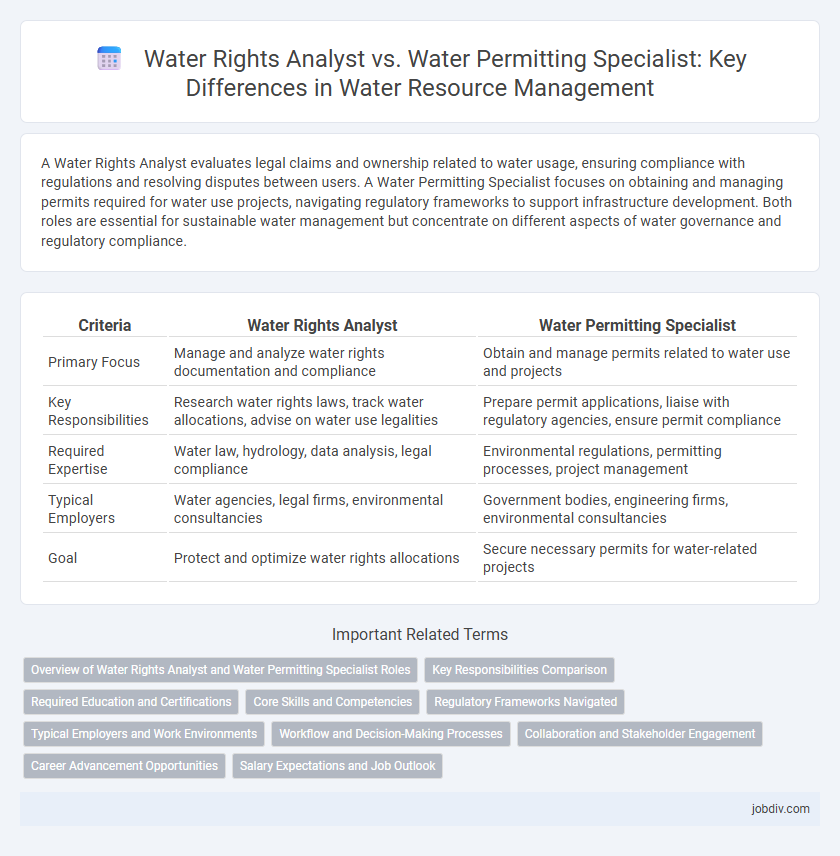A Water Rights Analyst evaluates legal claims and ownership related to water usage, ensuring compliance with regulations and resolving disputes between users. A Water Permitting Specialist focuses on obtaining and managing permits required for water use projects, navigating regulatory frameworks to support infrastructure development. Both roles are essential for sustainable water management but concentrate on different aspects of water governance and regulatory compliance.
Table of Comparison
| Criteria | Water Rights Analyst | Water Permitting Specialist |
|---|---|---|
| Primary Focus | Manage and analyze water rights documentation and compliance | Obtain and manage permits related to water use and projects |
| Key Responsibilities | Research water rights laws, track water allocations, advise on water use legalities | Prepare permit applications, liaise with regulatory agencies, ensure permit compliance |
| Required Expertise | Water law, hydrology, data analysis, legal compliance | Environmental regulations, permitting processes, project management |
| Typical Employers | Water agencies, legal firms, environmental consultancies | Government bodies, engineering firms, environmental consultancies |
| Goal | Protect and optimize water rights allocations | Secure necessary permits for water-related projects |
Overview of Water Rights Analyst and Water Permitting Specialist Roles
Water Rights Analysts evaluate and manage legal entitlements related to water usage, ensuring compliance with water laws and regulations for various stakeholders. Water Permitting Specialists focus on securing and maintaining permits required for water use, overseeing regulatory approvals for projects impacting water resources. Both roles require expertise in water law, resource management, and regulatory frameworks to support sustainable water allocation and development.
Key Responsibilities Comparison
A Water Rights Analyst primarily evaluates legal water entitlements, ensuring compliance with water laws and regulations, while analyzing water use data for allocation and transfer purposes. A Water Permitting Specialist focuses on obtaining, managing, and renewing permits related to water usage, coordinating with regulatory agencies to facilitate project approvals. Both roles require expertise in water policy and environmental regulations but differ in their emphasis on legal analysis versus regulatory administration.
Required Education and Certifications
A Water Rights Analyst typically requires a bachelor's degree in environmental science, water resource management, or a related field, often complemented by certifications such as Certified Water Rights Examiner (CWRE) or Professional Hydrologist (PH). Water Permitting Specialists usually hold degrees in environmental engineering, law, or natural resource management, with certifications like Certified Environmental Professional (CEP) or specific state-level water permitting credentials. Both roles demand a solid understanding of water laws and regulatory frameworks, but certification requirements vary based on jurisdiction and job complexity.
Core Skills and Competencies
Water Rights Analysts specialize in legal frameworks, assessing water rights claims, and interpreting regulatory policies to ensure compliance and resolve disputes. Water Permitting Specialists focus on navigating permitting processes, preparing documentation for water use approvals, and coordinating with regulatory agencies to secure necessary permits. Both roles require strong knowledge of water laws and environmental regulations, but Analysts emphasize legal analysis while Specialists prioritize project management and permit acquisition.
Regulatory Frameworks Navigated
Water Rights Analysts specialize in interpreting and applying complex water laws and regulations to secure legal entitlements for water use, often navigating state-specific water codes and interstate compacts. Water Permitting Specialists focus on obtaining and maintaining necessary permits for water usage and discharge, ensuring compliance with environmental regulations such as the Clean Water Act and state-level permitting requirements. Both roles require expertise in regulatory frameworks but differ in scope, with Analysts emphasizing legal rights and Specialists managing operational compliance.
Typical Employers and Work Environments
Water Rights Analysts typically work for government agencies such as the Bureau of Land Management or state water resource departments, as well as environmental consulting firms, focusing on legal and regulatory aspects of water use. Water Permitting Specialists are often employed by municipal governments, environmental consulting companies, and large industrial corporations, where they handle the technical and procedural requirements of obtaining water use permits. Both roles frequently operate in office settings, but may also spend time in the field for site assessments and regulatory compliance inspections.
Workflow and Decision-Making Processes
Water Rights Analysts evaluate legal entitlements and water-use claims by researching historical usage data and regulatory frameworks, ensuring compliance with state and federal laws. Water Permitting Specialists oversee the approval process for water usage, coordinating with environmental agencies to assess impact studies and facilitate permit issuance. Both roles require collaboration with stakeholders but differ as Analysts focus on rights validation while Specialists manage regulatory approvals and operational permits.
Collaboration and Stakeholder Engagement
Water Rights Analysts and Water Permitting Specialists collaborate closely to ensure compliance with regulatory frameworks while securing necessary water access for stakeholders. Water Rights Analysts focus on legal documentation and historical usage data, enabling informed decision-making during permitting processes led by Water Permitting Specialists. This partnership enhances stakeholder engagement by aligning legal requirements with practical water management needs, fostering transparent communication among regulatory agencies, landowners, and community groups.
Career Advancement Opportunities
Water Rights Analysts specialize in evaluating legal entitlements and transactions related to water use, offering pathways to senior legal advisory roles or regulatory compliance management. Water Permitting Specialists focus on securing and managing water use permits, enabling career growth toward environmental consulting or governmental regulatory positions. Both careers leverage expertise in water resource regulations, with advancement opportunities driven by experience in policy interpretation and stakeholder negotiation.
Salary Expectations and Job Outlook
Water Rights Analysts typically earn between $65,000 and $85,000 annually, reflecting their expertise in legal and regulatory water entitlement issues; meanwhile, Water Permitting Specialists command salaries ranging from $60,000 to $80,000, driven by their role in facilitating compliance with environmental and local water use permits. The job outlook for Water Rights Analysts is growing steadily due to increasing water scarcity and complex water laws, while Water Permitting Specialists see stable demand as regulatory frameworks evolve and infrastructure projects require permit management. Both careers offer strong opportunities within environmental consulting firms, government agencies, and water resource management organizations.
Water Rights Analyst vs Water Permitting Specialist Infographic

 jobdiv.com
jobdiv.com